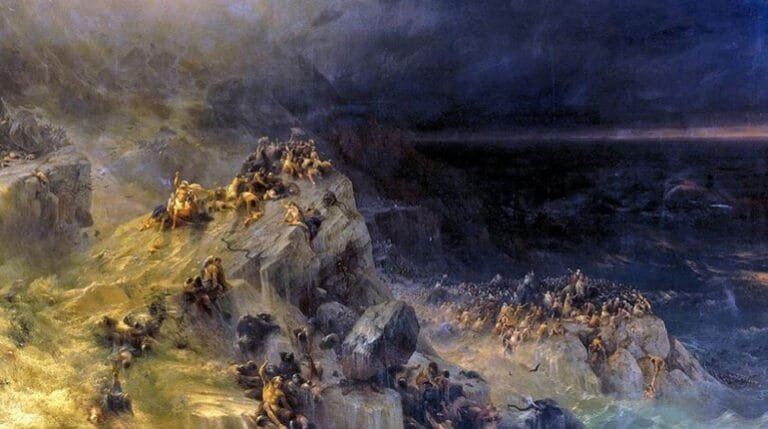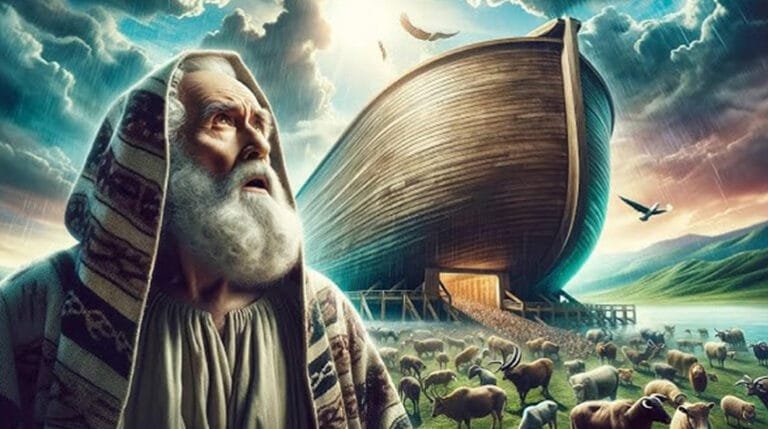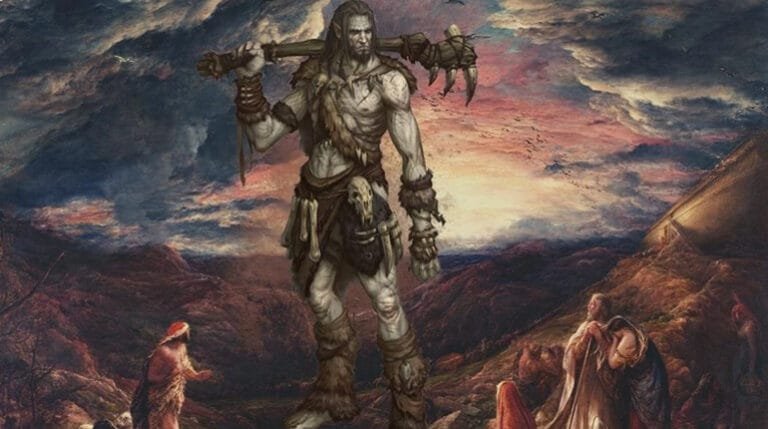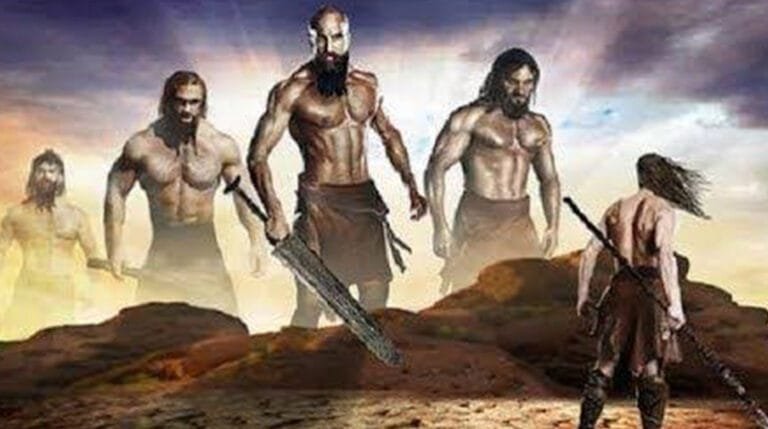Why God Preserved Noah’s Pure Bloodline

Within the biblical narrative, the story of Noah and the Deluge stands as a profound testament to divine intervention in the face of corruption. The events leading up to the Flood, particularly the passage in Genesis 6:1-4, provide a complex view of the nature of humanity during that time. Here, the mingling of the “sons of God” and “daughters of men” led to the emergence of the Nephilim, beings that were considered mighty and notorious. This unholy union hinted at a corruption that reached beyond moral degradation, suggesting an alteration in the very fabric of human DNA. In this context, God’s decision to preserve Noah and his family takes on significant meaning; it was a necessity not merely for the sustenance of life but for the reclamation of humanity’s pure genetic line.
As we explore this divine preservation in greater depth, we confront the challenging implications of these scriptural passages. The notion of divine DNA, corrupted by otherworldly beings, propels us into unchartered realms of theological inquiry. Why did God choose Noah, and what does it mean for the integrity of the human race? The importance of Noah’s pure bloodline serves as a pivotal theme: it is not only a narrative of survival but also one that affirms God’s sovereignty and intention for humanity. In understanding the purity of Noah’s lineage, we can better grasp the overarching narrative of redemption that unfolds throughout Scripture.
The Sons of God and Daughters of Men
Genesis 6:1-4 introduces a controversial passage that has intrigued theologians, scholars, and believers alike. It raises questions regarding identity, influence, and divine purpose. The text states that the “sons of God saw that the daughters of men were beautiful, and they took wives for themselves, whoever they chose.” This imagery of the “sons of God” is commonly interpreted in various ways, generally suggesting either the line of Seth, or, as many argue, the fallen angels who descended to have relations with human women. This interpretation, particularly prominent in the Book of Enoch, paints a picture of beings who violated divine boundaries, intertwining their essence with humanity, thus creating a hybrid race known as the Nephilim.
The offspring of these unions, the Nephilim, are believed to have exhibited immense physical strength and stature, yet they embodied fallen spiritual nature, further reflecting a genetic and spiritual corruption of God’s original design. Their existence was not only an aberration of God’s intention for humanity but also a predication of violence and wickedness that gripped the world. Genesis 6:11 remarks that “the earth was filled with violence,” a direct result of this blending of entities and their progeny, which ultimately led to a complete perversion of God’s creation.
The Corruption of the Human Race
As we move deeper into Genesis 6, we encounter God’s response to this grievous situation. In verse 13, God declares, “The end of all flesh has come before Me,” indicating that the moral and genetic fabric of humanity had become irreparably tainted. This divine pronouncement suggests that the very essence of what it means to be human had been compromised due to this intermingling of heavenly and earthly beings. Thus, God’s plan for humanity was under siege, necessitating a profound intervention.
This understanding of corruption extends beyond simple moral failure; it introduces a genetic component that poses existential threats to God’s created order. The Nephilim, with their hybrid makeup, represented a significant departure from God’s design, threatening the purity of the human lineage as ordained at creation. Therefore, the Flood served as God’s means of starting anew, erasing the corrupted and establishing a foundation for the future.
Noah’s Purity and Divine Selection
In this dire landscape of moral and genetic degradation, Noah emerges as a beacon of hope. Genesis 6:9 describes Noah as “a just man, perfect in his generations.” This phrase, in particular, emphasizes his unique status among the population; it is telling that Noah is identified as “perfect in his generations,” suggesting a literal genetic purity that set him apart from the corrupted lineage around him. God, in His wisdom, selected Noah to be the anchor of the human race moving forward.
The preservation of Noah’s bloodline indicates that there existed individuals untouched by the incursions of the Nephilim. Noah’s righteousness and obedience to God’s commands allowed him to stand as a remnant through which God could ultimately realize His redemptive purposes. The Ark, constructed under divine guidance, became the vessel not only for saving lives but for securing the continuation of a pure genetic line essential for post-flood humanity.
The Significance of the Ark
The Ark itself symbolizes God’s provision in a time of great turmoil and chaos. By instructing Noah to build an Ark, God was not merely saving Noah and his family; He was also ensuring the survival of “every kind of living thing,” as outlined in Genesis 6:19-20. Each creature taken aboard represented a meticulous preservation of God’s creation, through which humanity would once again have the opportunity to thrive and reconnect with God’s original intent.
Within this context, the Ark served as a protective barrier between the corrupted world and the new beginning that God intended. Anticipating the disastrous consequences of interbreeding between divine and human realms, God effectively closed the door on the Nephilim lineage as the floodwaters rose, allowing only the untainted bloodline of Noah to endure.
The Post-Flood Rebirth of Humanity
Following the Flood, we witness a recommencement of humanity as Noah’s sons—Shem, Ham, and Japheth—become the progenitors of the post-deluge population. In this new world, the divine mandate remains unaltered, urging humanity to “be fruitful and multiply, and fill the earth” (Genesis 9:1). The implications of this divine blessing are profound, particularly knowing that the bloodline preserved through Noah came with a sense of accountability to honor God’s intentions.
It’s essential to understand that while the initial threat of Nephilim corruption was mitigated, the potential for moral failure remained. The genealogies that follow, particularly through the line of Shem, eventually lead to the birth of Abraham and the establishment of a covenant people chosen by God to demonstrate righteousness and faithfulness. This covenantal relationship underscores the redemptive arc that traces from Noah to the eventual fulfillment found in Jesus Christ.
Implications for Humanity Today
The narrative surrounding Noah and the Flood conveys multifaceted theological truths that extend beyond the ancient world. One significant implication lies in the understanding of purity and divine intention as it relates to humanity’s ongoing struggle with sin and corruption. Just as God preserved a remnant through Noah, He continues to call individuals to uphold righteousness in a world plagued by moral decay.
Furthermore, the story of Noah elicits reflections on God’s continual desire for relationship with humanity, showcasing the lengths to which He is willing to go to redeem. Even in the face of profound disobedience and the resultant chaos stirred by human actions, God offers a path toward restoration that remains open to those who trust in Him. In our modern context, believers may find encouragement in the story of Noah, recognizing that although the tides of culture and society can be overwhelming, there is still a divine plan that seeks to preserve and redeem.
Conclusion
In examining the narrative of Noah within the framework of Genesis 6, it is evident that God’s preservation of Noah’s pure bloodline was not merely a story of survival but a profound act of redemption and hope for humanity. The incursion of the Nephilim represented a significant loss of purity and divine intention, prompting God’s decisive action through the Flood. Yet, in Noah, God found a faithful servant, a remnant whose genetic integrity served as the vessel for a new beginning and a new covenant.
This narrative ultimately sets the stage for the grand storyline of Scripture that culminates in Jesus Christ, the ultimate Redeemer. While the threat of corruption remains a reality, the message of hope and redemption for the human race echoes through generations. Thus, the account of Noah serves as a reminder of God’s faithfulness and the promise that He is committed to preserving that which is pure, guiding humanity towards a fuller understanding of His divine purpose and design.






